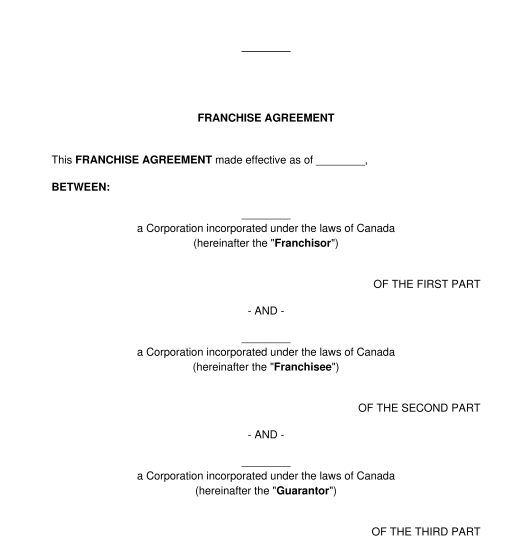 05/11/2025
05/11/2025

Answer a few questions and your document is created automatically.

Your document is ready! You will receive it in Word and PDF formats. You will be able to modify it.

 05/11/2025
05/11/2025
 Word and PDF
Word and PDF
 13 to 20 pages
13 to 20 pages



A Franchise Agreement is a contract between a franchisor and a franchisee. Under the agreement, the franchisor allows the franchisee to use its intellectual property rights and information for the franchisee's business. Essentially, this means the franchisor transfers the franchise's reputation to the franchisee for their commercial use and benefit.
For example, a franchisor could own a restaurant chain and allow a new restaurant to open at a specific location. Instead of the franchisor owning and operating the restaurant, they could enter into a franchise agreement with a franchisee. The franchisee will be responsible for operating the restaurant.
To join the business, the franchisee will pay the franchisor an initial fee and ongoing royalty fees (payment on sales). The franchisor will continue to oversee the franchisee's business operations and provide ongoing advice.
A licence and a franchise agreement share many similarities in that intellectual property rights (trademark, copyright, or patent) are being granted. The primary difference lies in the degree of control. A franchise is a form of agreement that requires ongoing supervision and control by the franchisor. A licence does not require a degree of control. Furthermore, in a franchise business structure, the franchisee uses all of the franchisor's business methods and marketing strategies. On the other hand, a licence does not usually grant or allow the licensee to use the licensor's business. Licensees and licensors are significantly more independent than franchisees and franchisors.
Yes. Having an agreement to franchise is necessary. Additionally, it is necessary that the franchisor give a franchise disclosure document to the franchisee. The franchise disclosure includes the business structure, the length of time the franchisor has been in business, the number of franchises sold, and more.
A franchise agreement must contain important details including:
Franchisors and Franchisees can be structured as either:
Normally, they are both structured as corporations. However, it may be possible that the Franchisor is a corporation and the Franchisee is a sole proprietor. The signers to the agreement must be at least of majority age and not under a disability. The ages of majority are as follows:
The duration of a franchise agreement is normally a fixed-term. The duration of the fixed-term of the agreement depends on the franchisor and the franchisee; but normally, franchises run for an extensive period, usually around 25-30 years.
After the document is complete, the Franchisor and Franchisee must sign and date the agreement. Each party needs to keep a signed copy for their own records.
In Ontario, Manitoba, British Columbia, Alberta, New Brunswick, and Prince Edward Island, before the Franchisee can invest in the Franchise and sign this agreement, they must receive a franchise disclosure document and a certificate from the Franchisor. These documents outline information about the franchise including the business structure, the length of time the franchisor has been in business, the number of franchises sold, and more.
A franchise disclosure document should be attached to the franchise agreement. This is a document that outlines information about the franchise including the business structure, the length of time the franchisor has been in business, the number of franchises sold, and more.
The franchise disclosure is a document that allows the investing franchisee to obtain more information about their investment (the franchise) in order to help them make an informed decision on whether or not the franchise is a good investment opportunity. The law regarding disclosure documents is strict in some jurisdictions.
Franchise legislation is based on disclosure laws. Not every Province and Territory will have them. Disclosure laws apply in Ontario, Manitoba, British Columbia, Alberta, New Brunswick, and Prince Edward Island. Quebec has its version of rules governing franchise agreements, called contracts of adhesion. The following pieces of legislation govern disclosure law:
Disclosure law requires Franchisors to deliver to prospective Franchisees a certified franchise disclosure document that outlines information about the franchise. The information includes the business structure, the length of time the franchisor has been in business, the number of franchises sold, and more.
In Provinces and Territories without disclosure laws, it is not mandatory to deliver to prospective Franchisees a certified franchise disclosure document. However, most Franchisors will still provide this information to incentivize investors.
You fill out a form. The document is created before your eyes as you respond to the questions.
At the end, you receive it in Word and PDF formats. You can modify it and reuse it.
Franchise Agreement - Sample, template - Word & PDF
Country: Canada (English)